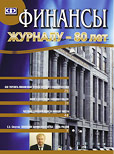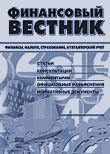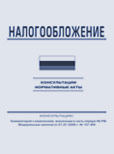Содержание
Финансы и бюджет: проблемы и решения
Тезисы выступления министра финансов Российской Федерации
А.Г. Силуанова на парламентских слушаниях в Государственной Думе Федерального Собрания РФ 23 июня 2015 года.
В.В. Климанов, директор Института реформирования общественных финансов, заведующий кафедрой РАНХиГС при Президенте РФ, доктор экономических наук
vvk@irof.ru
А.А. Михайлова, начальник отдела Института реформирования общественных финансов, старший преподаватель РАНХиГС при Президенте РФ, кандидат экономических наук
E-mail: aam@irof.ru
В статье рассмотрены основные показатели исполнения бюджетов высокодотационных субъектов РФ, а также представлены предложения по совершенствованию бюджетного законодательства России в сфере представления межбюджетных трансфертов таким регионам.
Ключевые слова: высокодотационные регионы, межбюджетные трансферты, субсидии.
А.С. Чулков, заместитель начальника отдела сводного планирования департамента финансов администрации муниципального образования г. Краснодара, кандидат экономических наук
E-mail: finance-journal@mal.ru
Реформирование государственных и муниципальных финансов России предполагает реализацию мер по повышению открытости и прозрачности бюджетной системы. Предметом исследования настоящей статьи является роль и место «бюджета для граждан» в условиях продолжающейся реформы. В статье сделан вывод о том, что повышение прозрачности и открытости бюджетной системы Российской Федерации путем активного практического использования концепции «бюджета для граждан» требует создания эффективных механизмов взаимодействия с гражданами, обеспечения доступности соответствующей информации для разных целевых групп, вовлечения населения территории в принятие решений.
Ключевые слова: бюджетная система, территориальные финансы, «бюджет для граждан», открытое правительство, повышение эффективности расходов бюджета, программно-целевой метод управления.
Казначейство: становление и развитие
И.С. Тапсиев, руководитель УФК по Ставропольскому краю, кандидат технических наук, доцент
С.А. Бабушкина, начальник отдела расходов УФК
E-mail: Kornienkotv@ftr.ru
Самым используемым платежным документом является Заявка на кассовый расход. В статье подробно рассматривается новация, внедряемая Федеральным казначейством – сводная заявка на кассовый расход.
Ключевые слова: платежные документы, новый сервис, Заявка на кассовый расход.
С.В. Сметанин, руководитель УФК по Астраханской области, кандидат экономических наук
E-mail: ufk25@roskazna.ru
В статье речь идет о предоставлении краткосрочных кредитов территориальными органами Федерального казначейства как о процедуре, гораздо более защищенной от рисков невозврата, чем бюджетные кредиты, которые дает Минфин России и коммерческие банки.
Ключевые слова: кредит, бюджетный кредит, риск невозврата.
Список членов Совета.
На вопросы читателей отвечают специалисты Минфина России и Федерального казначейства.
Налоги: теория и практика
В.Г. Пансков, профессор кафедры «Налоги и налогообложение» Финансового университета при Правительстве РФ, доктор экономических наук, заслуженный экономист РФ
E-mail: 5868116@mail.ru
Автор дает обзор итогов Международного налогового симпозиума (седьмого по счету) в Иркутске, в котором приняли участие налоговики России, Китая, Украины, других стран. Главное внимание участники уделили налоговым проблемам российских регионов, переживающих большие проблемы с покрытием дефицита. Дается критический разбор предложений участников форума, среди которых были как ученые, так и налоговики-практики.
Ключевые слова: нижестоящие бюджеты, дефицит, трансферты, прогрессивное налогообложение доходов, НДС-счета.
С.В. Разгулин, действительный государственный советник РФ 3 класса
E-mail: minfin608@rambler.ru
Автор разбирает принципы декларирования гражданами своих активов и счетов в банках, подробно разбирая положения Закона № 376-ФЗ (в ред. Федерального закона от 06.04.2015 № 85-ФЗ) и порядок внесения в декларацию сведений о контролируемых иностранных компаниях. Раскрываются преимущества, которые дает декларирование. Также автор указывает на сохраняющиеся в законодательной базе противоречия, касающиеся рассматриваемой темы.
Ключевые слова: налогообложение доходов, источники доходов, декларант, контролируемые иностранные компании, освобождение от ответственности.
Н.Ю. Корниенко, заведующая лабораторией Российской академии народного хозяйства и государственной службы при Президенте РФ, кандидат юридических наук,
E-mail: Elisa18@yandex.ru
Н.Ю. Постникова, старший научный сотрудник РАНХиГС при Президенте РФ
E-mail: postnikova_nu@rambler.ru
Статья посвящена проблемам налогообложения прибыли иностранных корпораций при осуществлении деятельности на территории другого государства (в том числе РФ), а также через постоянное представительство. Проведен критический анализ рекомендуемого Модельной налоговой конвенцией ООН принципа исчисления прибыли постоянного представительства – «принципа притяжения». Освещен вопрос о реализации «принципа притяжения» в ряде международных соглашений об избежании двойного налогообложения, в национальном законодательстве участников таких объединений, как БРИКС и ЕАЭС. Проведен сравнительный анализ действующего налогового законодательства РФ и правоприменительной практики в отношении «принципа притяжения» и выдвинуты соответствующие рекомендации. Рассмотрены отдельные схемы уклонения иностранных корпораций от уплаты налогов и возможность применения «принципа притяжения» для целей противодействия таким схемам.
Ключевые слова: постоянное представительство, налог на прибыль, соглашение об избежании двойного налогообложения, модельная налоговая конвенция, принцип притяжения, размывание налоговой базы, уклонение от уплаты налогов.
Страхование
В.Ю. Балакирева, кандидат экономических наук
E-mail: Balakireva@minfin.ru
В материале приводятся цифровые показатели, достигнутые страховой отраслью России, в сравнении с запланированными Стратегией развития страховой деятельности в РФ до 2020 года. Анализируются главные законодательные новации, рассматриваемые Госдумой и направленные на совершенствование регулирования отраслью. Автор призывает переосмыслить роль страхования в экономике и отойти от парадигмы принуждения к страхованию субъектов хозяйственной деятельности и граждан.
Ключевые слова: стратегия развития, отраслевые показатели, добровольное страхование, совершенствование регулирования.
О.А. Гусева, Высшая школа экономики, бакалавр
В.Х. Эченикэ, доцент кафедры управления рисками и страхования МГУ, кандидат экономических наук
E-mail: etxe@bk.ru
На основе данных о регистрации страховых компаний, о выдаче и отзыве лицензий, с последующим включением/исключением из реестра, анализировались различные показатели воспроизводства страховых компаний на российском рынке, в т.ч. путем построения таблицы «смертности» российских страховщиков, с помощью которой определена ожидаемая продолжительность жизни вновь зарегистрированных компаний в период с 2008 по 2013 год.
Ключевые слова: возрастной состав страховых компаний, воспроизводство страховых обществ, коэффициент рождаемости участников рынка.
Э.С. Гребенщиков, кандидат исторических наук
E-mail: Finance-journal@mail.ru
Е.В. Злобин, доцент, кандидат исторических наук
E-mail: evgeniy_zlobin@rgs.ru
Л.Б. Парфенова, декан экономического факультета, заведующая кафедрой «Финансы и кредит» Ярославского университета, профессор, доктор экономических наук
В начале июня 2015 г. состоялась XVI Международная научно-практическая конференцию по страхованию «Стратегия развития страховой деятельности в РФ: первые итоги, проблемы, перспективы».
Участники проанализировали проблемы, которые приходится решать страховому сообществу и бизнесу. Тема № 1 – по-прежнему ОСАГО, которое не уходит с повестки дня и после корректировки тарифов; трудное взаимодействие с судейским корпусом, который рассматривает жалобы в адрес страховщиков; необходимость развития страхования в регионах. Тем не менее, несмотря на трудности макроэкономического характера, Правительством и Минфином России многое сделано и делается по развитию рынка страхования. В Европе у страховщиков другие проблемы. На первом плане там вопрос об увеличении резервов под возросшие риски.
Ключевые слова: конференция, стратегия, научно-педагогическое сообщество, ОСАГО, темпы роста, перспективы отрасли, состояние рынка.
Вопросы теории финансов
Н.В. Васильева, заведующий кафедрой предпринимательского и финансового права Байкальского государственного университета экономики и права, кандидат юридических наук, доцент
E-mail: nativi@ya.ru
Статья посвящена исследованию категории «доход» с финансовых позиций. Рассматривая доход как финансовую категорию, анализируя признаки финансов (в частности, денежный характер и фондовую природу), автор предлагает своё определение дохода.
Ключевые слова: доходы, финансовое право, финансы, финансовые ресурсы.
Информация
E-mail: spletuhov@mail.ru
В июне 2015 г. Банк России представил рабочей группе Государственной Думы перечень наиболее важных нормативных актов, принятых ЦБР и касающихся, прежде всего, инвестирования средств страховых резервов и собственных средств страховщика. Мегарегулятор делает упор на контроле за наличием у страховых организаций, отнесенных к повышенной группе риска, реальных активов.
Ключевые слова: нормативные акты, страховые резервы, риск-ориентированный надзор.
Annotation
Theses of speech of A.G. Siluanov - the Minister of Finance of the Russian Federation at the parliamentary hearings in the State Duma of the Federal Assembly of the Russian Federation on 23 of June 2015.
V.V. Klimanov, Director of Institute for Public Finance Reform, head of the Department of RANEPA, doctor of economics
E-mail: vvk@irof.ru
A.A. Mikhaylova, head of department of Institute for Public Finance Reform, senior lecturer at RANEPA, candidate of economics
E-mail: aam@irof.ru
The article describes the main indicators of the budgets of highly subsidized Russian regions, and presents potential measures for improving the budget legislation in the field intergovernmental fiscal relations.
Keywords: highly subsidized regions, intergovernmental fiscal transfers, subsidies.
A.S. Chulkov, deputy head of department of consolidated planning of the Department of Finance of the Administration of municipal establishment of Krasnodar, candidate of economic sciences.
E-mail: finance-journal@mal.ru
Reforming the state and municipal finance of Russia assumes implementation of measures to increase the openness and transparency of the budget system. The subject of this article is to study the role and place «budget for citizens» in the face of continuing reform. The article concludes that an increase in the transparency and openness of the budget system of the Russian Federation through active practical use of the concept of «budget for citizens» requires the creation of effective mechanisms of interaction with citizens, ensure the availability of relevant information for different target groups, public involvement in the decision-making territory.
Keywords: budget system, territorial finance, «the budget for the citizens», open government, improve the efficiency of budget expenditures, program-target method of management.
I.S. Tapsiev, head of the Administration of Federal Treasury across the Stavropol region, candidate of technical sciences, associate professor
S.A. Babushkina, head of department of expenditures of the Administration of Federal Treasury
E-mail: Kornienkotv@ftr.ru
The most used payment document is the request for cash expenditure. Article focuses on innovation introduced by the Federal Treasury – consolidated request for cash expenditure.
Keywords: payment documents, new service, request for cash expenditure.
S.V. Smetanin, head of the Administration of Federal Treasury across the Astrakhan region, candidate of economic sciences
E-mail: ufk25@roskazna.ru
Article tells about granting a short – term loans by the territorial bodies of the Federal Treasury as about the procedure more protected from risk of non - return than budget credits given by the Ministry of Finance of Russia and commercial banks.
Keywords: loan, budget loan, risk of non – return.
List of the Council’s members.
Specialists of the Ministry of Finance of Russia and Federal Treasury answer the questions of readers.
V.G. Panskov, professor of chair “Taxes and taxation” of the Financial University under the Government of the Russian Federation, doctor of economic sciences, honored economist of the Russian Federation.
E-mail: 5868116@mail.ru
Author gives a review of the International Tax Symposium (VII) in Irkutsk attended by the tax specialists of Russia, China, Ukraine and other countries. The main attention was paid to the tax problems of Russian regions experiencing big problems with covering deficit. Article provides critical analysis of proposals of the forum participants among whom there were scientists and tax practitioners.
Keywords: lower budgets, deficit, transfers, progressive income taxation, VAT accounts.
S.V. Razgulin, full state councilor of the Russian Federation of the 3rd class
E-mail: minfin608@rambler.ru
Author analyses the principles of declaration by citizens of their assets and accounts in the banks, in detail examines the provisions of Law № 376 – FL (amended by the Federal law from 06.04. 2015 № 85 - FL) and order of adding information about controlled foreign companies to the declaration. Article reveals the benefits of declaring. Also author indicates the controversies in the legislative base concerning the subject of considered theme.
Keywords: income taxation, source of income, declarant, controlled foreign companies, exemption from responsibility.
N.Y. Kornienko, head of the laboratory of the RANEPA, PhD in Law
E-mail: Elisa18@yandex.ru
N.U. Postnikova, senior research officer of the RANEPA
E-mail: postnikova_nu@rambler.ru
The article is focused on the problems of profit taxation of foreign corporations carrying out activities in the territory of another country (including in Russia), as well as through a permanent establishment. The critical analysis of the profit calculation principle of a permanent establishment – the so-called “attraction principle” has been carried out, as recommended in the UN Model Tax Convention. The implementation of the “attraction principle” in a number of International Double Taxation Avoidance Agreements has been covered, as well as in the national legislations of individual member countries of associations with the participation of the Russian Federation (BRICS, EEU). A comparative analysis has been carried out, recommendations put forward on the basis of the current Russian tax legislation and law enforcement practice regarding the application of the “attraction principle”. Individual tax evasion schemes used by foreign corporations have been considered, and the applicability “attraction principle” for the prevention of such schemes.
Keywords: permanent establishment, income tax, double taxation avoidance agreement, model tax convention, attraction principle, tax base erosion, tax evasion.
V.Y. Balakireva, candidate of economic sciences.
E-mail: Balakireva@minfin.ru
Article provides the digital indicators achieved by the insurance industry in Russia in comparison with planned by Strategy of development of insurance activities in the Russian federation until 2020 and analyses the main legislative innovations considered by the State Duma directed to improvement of sector regulation. Author calls for rethinking the role of insurance in the economy and to move away from the paradigm of enforcement to insurance of subjects of economic activities and citizens.
Keywords: development strategy, sectoral indicators, voluntary insurance, improvement of regulation.
O.A. Guseva, Higher School of Economics, bachelor.
V.H. Echenike, associate professor of chair “Risk management and insurance” of the Moscow State University, candidate of economic sciences
E-mail: etxe@bk.ru
On the basis of data on registration of insurance companies, about issuance and revocation of licenses, with further inclusion/ exclusion from the register, article analyses various indicators of reproduction of insurance companies on the Russian market, including by constructing the tables of “mortality” of Russian insurers which determines prospective life expectancy of newly registered companies during the period from 2008 to 2013.
Keywords: age structure of insurance companies, reproduction of insurance companies, birth –rate of market participants.
E.S. Grebenschikov, candidate of historical sciences
E-mail: Finance-journal@mail.ru
E.V. Zlobin, associate professor, candidate of historical sciences
E-mail: evgeniy_zlobin@rgs.ru
L.B. Parfenova, dean of the Economic faculty, head of chair “Finance and credit” of the Yaroslavl University, professor, doctor of economic sciences.
The title of the conference reviewed was “Strategy of the development of the insurance business in the Russian Federation: results achieved, problems encountered and prospects”. Implementation of MTPL seems to remain problem # 1 of the Russian insurance industry. Speakers discussed the implications of the recent insurance rates upward revision, linkages between MTPL and casco, courts’ biased (in their view) approach toward complaints of the policyholders, the situation on the regional and far flung insurance markets.
Some experts underlined that in Europe insurers face different challenges and the one most sensitive was defined as “underreservation” due to the rising regulatory standards.
Prof. Igor Kotlobovsky, head of the risk management and insurance chair of the Moscow State University informed about participation in international exchanges and projects. He singled out partnership with renowned St John’s University (it has a celebrated school of insurance, risk management and actuarial sciences). B. Jean Kwon jointly with International insurance society (USA) undertook an in-depth and unique study of the evolvement and development of insurance studies and training courses world -wide and in historical perspective. They started from 19-th century to trace the establishment of insurance-related university courses in 26 countries. (Russia will be added to this list later on). The results of this thorough and long term work are inserted in the e-version of the book written by the Duo «The Collegiate Education in Risk Management and Insurance Globally: Past, Present and Future». Prof. Igor Kotlobovsky promised conference participants that Russian version of this research will soon be published. Of special value are those parts of the research which pertain to the employers’ side of the story – how the companies evaluate the training received by university graduates and its topicality in the rapidly changing legal and business environment.
Keywords: conference, strategy, academic community, MTPL, growth rates, market outlook.
N.V. Vasiljeva, head of chair of Entrepreneur and Financial Law of Baikal State University of Economics and Law, PhD in Law, associate professor.
E-mail: nativi@yandex.ru
The article is dedicated to the category of "revenue" from financial positions. Considering the revenue as a financial category, analyzing the characteristics of finance (in particular, the nature of money and the nature of the fund), the author proposes the definition of revenue.
Keywords: revenues, financial law, finance, financial resources.
E-mail: spletuhov@mail.ru
In June 2015 the Bank of Russia provided to the working group of the State Duma the list of the most important government regulations adopted by the CBR regarding the investment of funds of insurance reserves and own funds of the insurer. Mega regulator focuses on monitoring the insurance companies classified as high risk organizations on presence of real assets.
Keywords: regulations. Insurance reserves, risk – based supervision.











